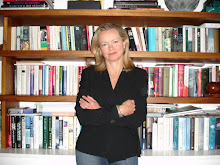
If this morning’s radio news is anything to go by, the BBC is more or less ignoring World Aids Day today. Perhaps it really is not that easy a news call? The 20th anniversary of a United Nations initiative to maintain awareness of a killer global virus vs. the Damian Green row, Mumbai aftermath, British tourists in Bangkok et al.
I was, however, quietly pleased to see various TV types, including the X-Factor finalists and judges, all sporting red lapel ribbons over the weekend. It is easy to knock these annual commemorations, perhaps particularly when they are sponsored by the UN. Yet this is not National Sausage Week or Take your Dog to Work Day.
It concerns a disease which affects 33 million people worldwide – the vast majority of whom do not have access to the anti-retroviral drugs which can both prolong & enhance their lives.
Twenty years on from the first World Aids Day, I was hoping that some entrenched attitudes and prejudices might have evolved. Alas, no. All these years of raising social awareness and of technological developments in the treatment of HIV/AIDS have singularly failed to change most generally held social perceptions of the disease.
When I mentioned to a friend that Starsky actor Paul Michael Glaser was presenting a BBC Radio 2 documentary about Aids in America, the response was: “I didn’t realise Starsky was gay!” He’s not – Glaser’s first wife, Elizabeth contracted HIV in 1981 through a blood transfusion while giving birth to the couple’s first child, Ariel. Ariel died in 1988; her mother in 1994, after founding the Elizabeth Glaser Pediatric Aids Foundation. Glaser himself has since worked tirelessly for the cause.
When my brother, Rory, was first diagnosed in the early 1980s, it wasn’t even called HIV. At the time, the virus was considered fatal, and so it turned out to be for so many young gay men in the U.S.A. and Europe. Now, the WHO classification is merely chronic, which is the same category as a condition such as diabetes. Then, the fear & loathing was compounded with ignorance & homophobic prejudice. I found that out for myself, as once good (and now former) friends started to shun social occasions, including my own wedding, if they suspected that my brother would be present.
Now, with life-long treatment and the regular use of medicine, HIV positive patients can enjoy a long and normal life. Nevertheless, limited access to the appropriate medication and continued high rates of transmission mean that the virus remains just as deadly for the millions already infected in much of sub-Saharan Africa and Asia.
Sadly, Rory didn’t manage to hang on quite long enough. He died in London’s Middlesex Hospital on May 16th 1994, aged 29-1/2, mere months before early UK drug trials started to show a faint glimmer of hope. I think about my brother constantly, perhaps more often than usual of late, as our elderly father slips into dementia and closer to his own end. So I don’t really need to sport a red ribbon in Rory’s memory today; I will however be wearing one proudly: for my brother, for all his mates who are gone and for everyone living with HIV, in the hope of continued advances, both in diagnosis, treatment and prevention – but perhaps more importantly – in prejudice.




